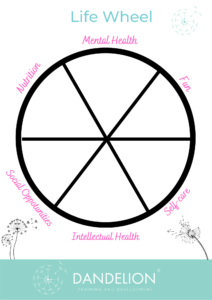Children’s Activity: Life Wheel Assessments
How busy is too busy?
How quiet is too quiet?
Sometimes, we can find ourselves in a situation where our mood is dropping and we cannot quite work out the reason why. This can be for a number of reasons, but frequently, when we examine our lives things have fallen out of sync.
The issues that often arise are either:
- Diaries are too quiet and have no focus, leading to isolation, to
- Diaries are heavy in only one or two areas which leads to dissatisfaction
- Diaries are so busy they leave little/no time for downtime and lead to overwhelm
Careful monitoring therefore becomes paramount to helping strike a careful balance. As the world operates 24/7, our diaries become filled with back to back events, commitments and social situations. However, for a child (and an adult) this can quickly make their world feel overwhelming and out of control. Their inbuilt desire to meet expectations can often mean that they will push through these emotions and the first indicator we see is at the point their symptoms become quite extreme. Therefore, ensuring that we structure their time carefully is vital.
So, what do we need to be aware of?
- What is the balance between school, extra curricular, sports and social opportunities alongside downtime?
- How much time do children/teens have to just ‘be bored’, self-care rest – this is when we process our days
- Are our expectations in the right place – encouraging them to achieve but not pushing to the brink of collapse
- Are there signs that they are struggling?
Each child has a different threshold for how much they can juggle. Some children and teens can very easily manage to juggle huge timetables full of activities and still thrive mentally. Others don’t want to disappoint but quickly feel that they are wading through quicksand and cannot maintain the pace.
An easy way to review this is to consider:
- Are they looking happy about their activities?
- Are they excited to take part?
- Do they talk positively about what they are involved in?
- Are they sleeping well?
- Are they making progress in all aspects – school, sports, hobbies, friends?
- Are they optimistic and generally happy?
- Are they becoming more withdrawn?
- Are they talking less about their activities?
- Are they sleeping / eating/ isolating more than previously?
- Are they acting out? behaving differently? avoiding? trouble at school?
- Are they falling behind or talking less/negatively about school or activities?
- Are there signs of overwhelm/trying to control things – self-harm, eating issues, reckless or risky behaviours?
We can review where they are by considering:
Stress often occurs when our lives become out of balance. Very quickly, our world can become dominated by one or two activities and lose it’s sync. For children, a balance should include their lives having:

By regularly evaluating a child’s diary and ensuring that there is a good balance over a month of all areas, you can support them to regulate their emotions and feel able to decompress. By ensuring that no one or two areas are dominating a child’s timetable you can also support them to learn important life skills. For instance, a child whose studies dominate over social experiences, over time will find that their concentration or confidence may be affected as they do not have time to socialise, laugh and have fun. Whilst a child whose hobbies dominate may feel that they cannot commit to school. Or, a child whose downtime dominates may find that their social opportunities are limited which affects self-esteem and confidence.
So, what can we do?
- Download a copy of the life wheel
- Sit together and evaluate what activities fit into each area
- Are there any areas which are overloaded?
- Are there any areas which are empty or low?
- Is there sufficient time for fun activities (with no expectations or goals)?
- Is there sufficient time for external achievements (outside of school)?
- Is there sufficient time for self-care and downtime?
- What are 3 actions you can take to create better balance?
Want more?
Don’t forget to register and subscribe to our newsletters to receive new activities every week!
Further help
 For more articles about mental health visit – ARTICLES
For more articles about mental health visit – ARTICLES
To learn more about child and adolescent mental health visit – COURSES
For resources to support child and adolescent mental health visit –RESOURCES
© Dandelion Training and Development – All Rights Reserved
